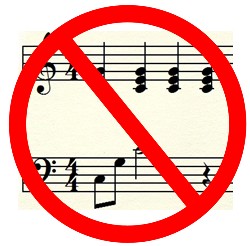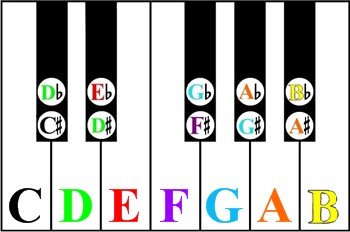In this article, I’m going to cover some very useful principals concerning how to learn piano chords fast without reading music. If you’ve struggled with traditional methods to learn piano chords in the past without the results you wanted, I have a visual approach that’s not only a whole lot faster but also a lot more fun.
When I took piano lessons as a child (and as an adult), I ended up with the same results that most former piano  students have. Little to no ability to successfully to play the songs that I always wanted to play. If you felt like a quitter, you’re not alone, because we’ve all felt that way and well meaning piano teachers have the tendency to perpetuate that feeling.
students have. Little to no ability to successfully to play the songs that I always wanted to play. If you felt like a quitter, you’re not alone, because we’ve all felt that way and well meaning piano teachers have the tendency to perpetuate that feeling.
In order to learn piano chords fast without reading music, we need a visual way to notate chords. The simplest way to illustrate chords is use keyboard diagrams. This way, there’s no need to translate dots from the page on to the keyboard. What you see is what you get.
I’m going to be using a special kind of keyboard diagram called a Keyshot. A Keyshot is a learning tool that not only illustrates the notes of a chord, but is color coded to also illustrate the number system. It’s a completely visual way to show you how to learn piano chords fast without reading music.
It’s part of a visual chord learning system called Color Score. The notes that make up a chord are selected from a numeric sequence that comprises the key of music that chord is from. I’ll give you a brief explanation of the number system and the Color Score concept, but all you need to know for this article is that the colors we’re using simply represent numbered tones that make up the chord.

First of all, what is a chord? A chord is defined as two or more notes played simultaneously. Three or more notes are more commonly considered a chord and this leads me into the 12 Major chords. Knowing the 12 Major Chords are absolutely essential if you want to know how to learn piano chords fast without reading music.
Before we dive into the 12 Major Chords, I need discuss where they actually come from. Every Major chord exists as the root chord of every Major key of music. I’m going to assume that you know all 12 different notes in music. But let’s look at them anyway.
As you can see, the notes that are on black keys have two different note names. They’re referred to as enharmonic notes. But even though they have two different note names, they’re essentially the same note. What you call any one of them at any given time depends on the context or key they’re in. So you have 12 different notes and that means you have 12 different Major chords.
Like I stated earlier, each one of these Major chords is the root chord of the key that it’s in. For example:
The root chord of the key of C Major is the C Major Triad.
The root chord of the key of F Major is the F Major Triad.
The root chord of the key of G Major is the G Major Triad.
As you an see, it’s an easy concept to understand. The root chord is always named after its own key. We’ll look at Major Chords again in the next segment.
The Fundamental Four
There are several different rabbit holes you can go down when trying to learn piano chords, but you absolutely must start at the right point so you can progress on to learning the chords that you always wanted to play. This means learning the fundamental four chords.
Chord symbol notation of the fundamental four (using C as an example)
Major: CM C Maj or C
Minor: Cm Cmin C-
Diminished: Cdim Co
Augmented: Caug C+ C+5
Major Chords: The King of All Chords
I’ve already touched on Major chords, aka Major Triads. (triad meaning 3). Major chords are among the most used chords in music. But how do you form a Major chord? We have to start off by making sure that you understand the concept of half steps and whole steps.
A half step is the distance from one key to another with no key in between them. It doesn’t matter if the key you’re on or the key you’re moving to is black or white.

A whole step is the distance from one key to another with one key in between them. It also doesn’t matter if the key you’re on or the key you’re moving to is black or white.

Now that we understand half steps and whole steps, let’s look at how to create a Major triad.
From here we’re going to use the tetrachord plus pattern to build our Major triad which just a simple pattern of half steps and whole steps.
The tetrachord plus pattern consists of four notes plus a whole step:
Whole step-Whole step- Half step-Whole step
The first step is to choose the root of the chord. In this case we’re going to choose C. After your start note is chosen, then start counting up the tetrachord plus pattern.

From here we choose the 1st, 3rd and 5th tones.

This gives us our C Major Triad

Of course, you can choose any note as your root and this pattern will help you find any Major Triad.


Think of this tetrachord plus pattern as a tool to help you find any Major chord in case you get lost. You should also know that you’re not going to need to use this tool when you learn all 12 Major Chords. They’re going to come to you automatically and visually without having to think about them.
Now that we know how to build a Major Chord, let’s look at a visual way to learn all 12 Major Chords. They have visual similarities that allow you to place them into four groups of three which makes them far easier to learn.
The Four Groups of Major Chords:
The Marshmallow Chords are named so because they’re white on the outside and white on the inside. (all white notes)
The Blackberry Jam Sandwich Chords are white on the outside and black on the inside
The Oreo Cookie Chords are black on the outside and white on the inside
The Chocolate and Vanilla Chunk Chords are all mixed up and unlike any other chord which puts them into their own category
Now that we have these chords defined in four groups that I refer to as visual order, this is the sequence in how you learn them:
C F G
D E A
D flat E flat A flat
G flat B flat B
This is a critical step if you want to know how to learn piano chords fast without reading music. Knowing these 12 Major Triads (or chords) will open up the door for you to proceed in learning any other chord in music no matter how sophisticated they may be. Cycle through them in the visual order that you see here until you know them by heart and can play them without hesitation. This video is an additional resource to help you learn these 12 Major chords fast.
Going from Major to minor
Once you’re familiar with all 12 Major triads, you’re literally a half step away from learning all 12 minor triads. To transition from a Major to a minor triad, all you have to do is lower the middle note (the 3rd) a half step.




Just as you cycled through all 12 Major chords in visual order, cycle through all minor chords. You’ll notice that their visual characteristics change when you go from Major to minor. That’s okay. Just use the visual characteristics from all of the Major Chords as a starting point. This video on minor chords further illustrates how easy minor chords are to learn.
Augmented Chords
An augmented chord consists of a Major Triad with the top note (the 5th) raised a half step. Augmented chords primarily function as transition chords such as passing chords. To create an augmented chord, take any Major triad and raise the 5th (the top note) a half step.


It’s just as simple to cycle through all of the augmented chords as the Major and minor chords. Progress though all of them in the visual order of Major chords to learn them all.
Diminished Chords
Diminished chords function in the same way as augmented chords. They mainly function as transition chords in the way of being passing chords also. To create a diminished chord, take any minor chord an lower the 5th a half step.




Get familiar with diminished chords by cycling through them in the same visual order as Major, minor and augmented chords.
We’ve covered the fundamental four chords and how to create them. Now let’s take our learning a step further by cycling through these chords in this sequence:
Major
minor
diminished
augmented
Here’s an animated image all fundamental chords in the key of C Major:
Cycle through the fundamental four chords in every Major key of music:
C F G
D E A
D flat E flat A flat
G flat B flat B
Suspended Chords
A suspended chord in one where the third tone is replaced by another note. These types of chords add a feeling of tension to a chord until they’re resolved which makes them more interesting than regular triads. The most common suspended chord is the sus4 chord. The chord symbol to notate them will be “sus” next the chord letter.

The 2nd can also be used as a suspension in place of the third.
Seventh Chords
Beyond the fundamental four chords, are 7th chords. 7th chords are technically extended chords but they’re so common, I feel that they should have their own category. Sevenths are referred to as color tones. They simply add color to a Major or minor chord. There can be confusion about them because there are two different types of 7th chords: Major 7th chords and dominant 7th chords.
Major 7th chord notation:
CM C Maj C ![]()
Dominant 7th chord notation:
C7 or Cm7 (for a minor chord)
A Major 7th chord consist of a Major triad with the Major 7th tone added to it. These types of 7th chords have a smooth consonant sound to them. You can find the Major 7th tone in a key of music by counting to 7 from the tonic which is the first note in the key.
 Adding the 7th to the C Major Triad creates the C Major 7th Chord
Adding the 7th to the C Major Triad creates the C Major 7th Chord
Another way to locate the Major 7th tone is find the note that is a half step below the root
Even though this is a shortcut to find the Major 7th tone, it’s still played above the chord when it’s in root position

A dominant 7th chord consist of a Major triad with the flatted 7th tone added to it. These types of 7th chords have a bluesy dissonant sound to them. You can find the flat 7th tone in a key of music by counting to 7 from the tonic and then moving down a half step. 
 other way to locate the dominant 7th tone is to find the note that is a whole step below the root.
other way to locate the dominant 7th tone is to find the note that is a whole step below the root. This note is also played above the chord when in root position.
This note is also played above the chord when in root position.

Extended Chords
Extended chords include notes that are also referred to as color tones. These notes are the 2nd and the 6th notes in the key. The Chord symbol would appear as C2 and C6.

If these chords include the Major or dominant 7th, these two notes are referred to as the 9th and 13th because there’s a rule that they are to be called by their higher extensions. Higher extensions are created by simply counting past the octave note up to the 13th tone.

The chord symbol would appear as C9 and C13 respectively. (notice they can exist in anywhere on the keyboard)


The higher extension rule also applies to the 4th which becomes the 11th when the dominant 7th tone is added. It also creates an extended chord but it still replaces the 3rd. The chord symbol will appear as C11.
Altered Chords
Altered chords include tones in them which are not in the key. They’re very indicative of jazz music although they’re found in contemporary popular music also but not as heavily. They too serve the same purpose as color tones. These are referred to as chromatic tones. The tones in any given altered chord are going to be a within a half step of the 2nd and the 5th notes.
These altered tones almost always include the dominant 7th tone and can occur in any combination of each other.







Altered chords can also include any of the regular color tones as well. Any of these chords can omit tones such as the 5th.
In Closing
This article covers more than about chords than most experienced piano players know about. Even though I’ve used the key of C Major to illustrate the different chord types, they can be transposed into any Major key. Keyshots show you how to learn piano chords without reading music the most effective way possible. Learn more about Color Score so you can sound like a professional at your piano or keyboard.
Until next time, Go Play.
Greg Lee
Latest posts by Greg Lee (see all)
- What is a minor/Major 7 Chord? - October 26, 2023
- 7 Chord Substitutions that Professionals Use - October 19, 2023
- 5 Simple Chord Tricks to Sound Amazing - October 5, 2023



